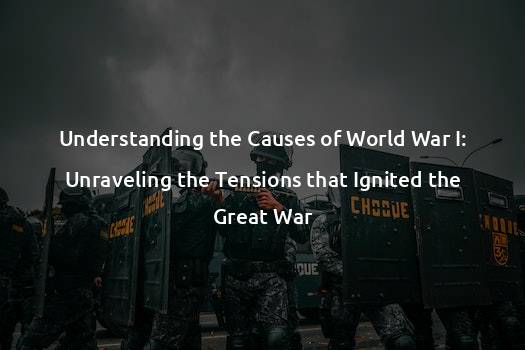Understanding the Causes of World War I: Unraveling the Tensions that Ignited the Great War
Understanding the Causes of World War I: Unraveling the Tensions that Ignited the Great War
World War I, also known as the Great War, was one of the most devastating conflicts in history. Lasting from 1914 to 1918, it involved major powers from around the globe and had far-reaching consequences that reshaped the world. Understanding the causes of World War I is crucial for unraveling the tensions that ignited this catastrophic war.
Militarism and Arms Race
One of the key causes of World War I was the intense militarism and arms race amongst the European powers. In the late 19th and early 20th centuries, several countries, including Germany, Britain, and France, significantly expanded their military capabilities. Nations engaged in a race to build larger armies, develop advanced weaponry, and create strong naval forces. This militaristic culture heightened tensions and increased the likelihood of war.
Alliances and Entangled Diplomacy
The complex system of alliances formed in Europe prior to World War I further exacerbated the growing tensions. Two major alliances emerged: the Triple Entente, consisting of Britain, France, and Russia, and the Central Powers, composed of Germany, Austria-Hungary, and Italy. These alliances were created as a means of deterrence but ultimately created a web of interconnected commitments, making it increasingly difficult to avoid war. When conflict erupted, the alliances pulled entire nations into the chaos, leading to a devastating global conflict.
Imperialism and Struggle for Power
Another significant factor contributing to the outbreak of World War I was imperialism and the intense struggle for power amongst nations. European powers were engaged in a race to acquire colonies and extend their influence around the world, creating competition and conflict. The rivalry for resources, territories, and markets heightened tensions and rivalries between major powers, particularly Germany and Britain. This imperialistic drive not only fueled nationalism but also created a volatile environment prone to conflicts and escalating hostilities.
Nationalism and Ethnolinguistic Tensions
Nationalism was a powerful force that played a crucial role in the outbreak of World War I. The late 19th century saw a surge in nationalist sentiments, with oppressed ethnic groups seeking independence and self-determination. This growing nationalism raised questions about the existing borders and sovereignty of nations, creating ethnolinguistic tensions. The assassination of Archduke Franz Ferdinand of Austria-Hungary in 1914 by a nationalist led to a chain reaction of events that eventually led to war, highlighting the dangerous interplay between nationalism and international relations at the time.
The Spark: Assassination of Archduke Franz Ferdinand
The assassination of Archduke Franz Ferdinand, heir to the Austro-Hungarian Empire, on June 28, 1914, acted as the spark that ignited World War I. The assassination by a Serbian nationalist created a diplomatic crisis, leading to Austria-Hungary’s declaration of war against Serbia. In response, various alliances were invoked, and the conflict quickly escalated into a full-scale war. This event demonstrated the fragility of the delicate international balance and the potential for a minor incident to spiral out of control swiftly.
The TLDR;
World War I was caused by a combination of factors, including militarism, alliances, imperialism, nationalism, and the assassination of Archduke Franz Ferdinand. The intense arms race and rivalries between nations, coupled with complex alliances and imperialistic ambitions, created a volatile environment prone to conflict. Nationalism and ethnolinguistic tensions further fuelled the fire. The assassination of Archduke Franz Ferdinand acted as the catalyst for a diplomatic crisis that quickly escalated into a global war. Understanding these causes is crucial for comprehending the complexities that led to the outbreak of the Great War and its profound impact on the world.







